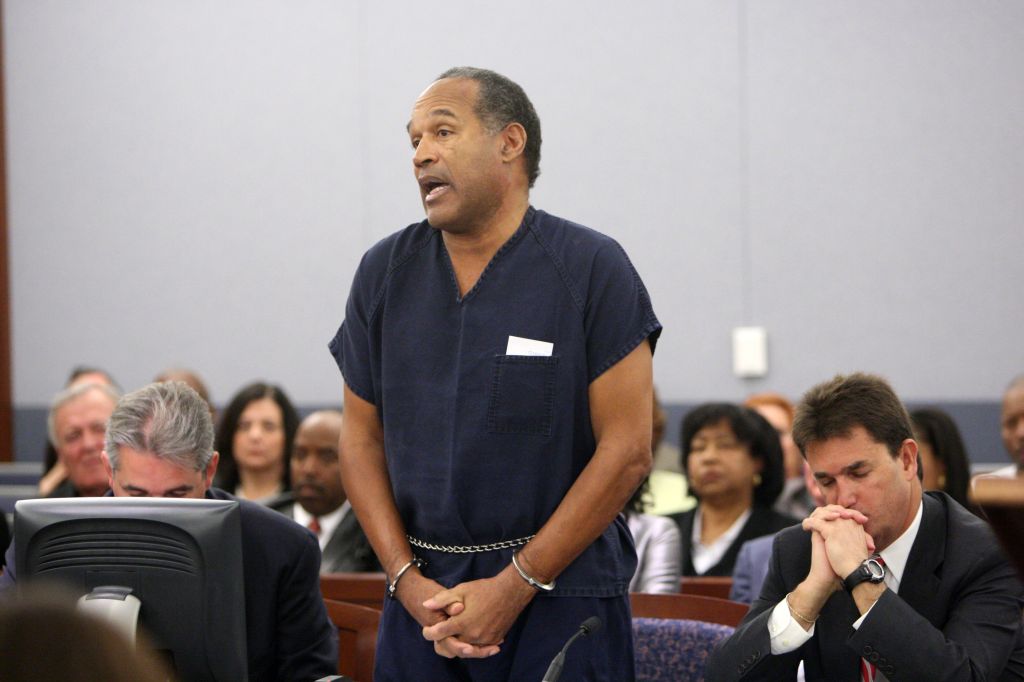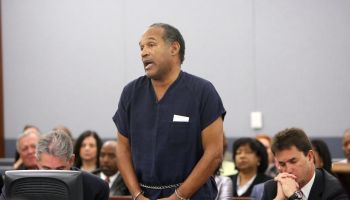
Source: ISAAC BREKKEN / Getty
On Thursday, July 20 ESPN will broadcast the parole hearing of O.J. Simpson.
Watching Simpson onscreen as prison time hangs in the balance will be just like 1995 all over again…but, also, not like 1995 at all. Gone is the Dream Team of lawyers, including the late Johnnie Cochran. No longer is Robert Sr. the most famous Kardashian. And no longer are so many Black folks so invested in setting the Juice loose…myself included.
Watching Simpson onscreen as prison time hangs in the balance will be just like 1995 all over again…but, also, not like 1995 at all.
Twenty-two years, one ESPN documentary and an Emmy-award winning TV series later, I now believe beyond a shadow of a doubt that O.J. killed his wife Nicole Brown Simpson and Ron Goldman. I remember—and am still embarrassed—at how happy I was in 1995 when Simpson was found not guilty. I remember when my bestie and I essentially told a white friend to shut up because she had no idea what she was talking about when she tried to break down why sexism and a systemic disregard for the victims of domestic violence had helped to free O.J.
What I can not remember is if I thought OJ was not guilty; I was too busy high fiving strangers on the street that—finally!—a Black man’s money had kept him out of prison.
In a twisted meeting of racism, capitalism and class, I felt like we’d somehow gotten over to a messed up Promised Land that let maybe-murderers walk. After Rodney King and Latasha Harlins and the L.A. Riots, I was willing to take what I could get, and a free O.J. was all that 1995 had to offer. Although there were Black people who thought differently (wiser)—Ta-Nehisi Coates detailed how he was always sure of Simpson’s guilt in this Atlantic essay—most felt like me. A 1994 poll of Californians showed that 62 percent of whites believed he was “very likely or somewhat likely” guilty, and only 38 percent of Black people did.
Law professor Kimberle Crenshaw said in 1994 that the trial was “a Rorschach on race and gender. Whatever your issue is, you can look at this case and you can see it.” And a 1995 New York Times article summed up what our choices were back then. The piece was called “Whose Side to Take – Women, Outrage And the Verdict On OJ Simpson.” Back then, there felt like two sides—the Black one and the white woman one.
O.J.’s acquittal seemed victorious to me because it (mistakenly) felt symbolic. And I did not care that it was possible to celebrate only by erasing many realities of what life had been for a battered woman. My feminism had its limits and on the day O.J went home to his Brentwood mansion, I was fine with that.
OJ’s acquittal seemed victorious to me because it (mistakenly) felt symbolic.
On Thursday, I won’t celebrate if he is told he can get out on parole. He’s not in prison for the murders but for a 2008 kidnapping charge in Nevada. And his sentence is like a plot development in the most farfetched, abysmal Lifetime movie ever—the kind you only keep watching because you can’t find the remote. There’s no way that would happen in real life, we’d say if there was a film where the Black man literally got away with being accused of murdering two white people (including a blonde woman) but then received 33 years for holding someone else in a hotel room for less than a day.
While O.J.’s been away, the Rorshach test that Crenshaw talked about in 1994 has taken on a new shape: It looks like a stronger, more widely embraced Black feminism. It looks like a space where Black women don’t have to choose if we are either Black or women. It looks like a space that Crenshaw named intersectionality, and it feels like something closer to a freedom to name our pain and build our support base and fight back against these complex oppressions; it was a space that was being diluted in 1995, but is expanding today.
Even though we will watch the parole decision on TV, this is O.J.’s real life. If he gets out, the world he will be in is a completely different one than he might remember. And this time, I won’t be in public celebrating his release.
















